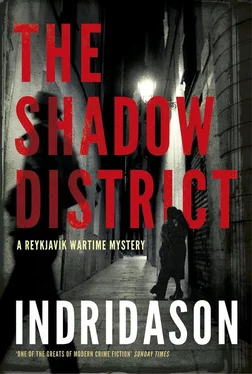‘What about her mother?’ prompted Konrád.
‘Petra’s mother?’
‘Yes.’
‘She ran a mending and dressmaking business during the war and Stefán was very interested in it for some reason.’
‘In the dressmaking business?’
‘Yes, specifically in a girl who used to work there, called Rósa-something, I think Petra said. She rang me after they’d talked. Knew I’d passed on her name to him.’
‘Could the name have been Rósamunda?’
‘Yes, Rósamunda, that sounds right.’
‘What about her?’
‘She was found murdered behind the National Theatre during the war. Does that sound familiar?’
‘Yes, it does, actually,’ said Konrád. ‘Why was Stefán so interested in her?’
‘I don’t know, but he asked lots of questions about her. Maybe you should talk to Petra yourself. Would you like her number? I’ve got it here somewhere. Just a minute...’
Petra clearly hadn’t followed in her mother’s footsteps: she was neither a dressmaker nor did she run her own business. In fact, judging by her outfit, she was completely indifferent to fashion. And, looking around her home, Konrád couldn’t see any needlework, or any hint of enthusiasm for handicrafts. It was almost as if, despite being well past middle age, she was still rebelling against everything her mother had stood for. It turned out that she was a few years older than he was and had got herself an education, as they used to call it when people stayed on at college to take their matriculation exams, though she hadn’t continued on to university. Instead she had taken the boat to Europe and gone travelling, before coming home and taking an admin job at the National Hospital, where she had worked for most of her career up until the banking collapse. At that point she had been made redundant as a result of cuts in the health service. She was, in addition, a divorcee with four children and what she described as heaps of adorable grandchildren.
As Konrád soon discovered, she never wearied of talking about herself, but he was reluctant to interrupt the flow. She lived in a block of flats in the east end, where she had wound up following her divorce, having been forced to part with the large detached family home in the smart suburb of Gardabær. Apparently she and her husband had quickly grown bored of each other once their children had flown the nest.
When Konrád finally managed to get a word in edgeways, Petra proved extremely interested in Stefán’s death and asked a lot of questions. He did his best to field them without giving away any details that might compromise the inquiry, saying only that the circumstances of Stefán’s death had been highly unusual and the police investigation was making good progress. He himself wasn’t directly involved, but he had been asked to look into one aspect of the case. Petra proved no less inquisitive about Konrád himself and bombarded him with questions. He tried to reply to them as best he could, feeling that it was only fair for him to be a little forthcoming, given that he had come here to extract information from her.
At long last he managed to steer the conversation round to Stefán’s visit. He had come to see her, Petra reckoned, about two weeks before she read of his death in the papers. She had recognised him immediately when his picture was splashed all over the media, but it hadn’t even crossed her mind that she might be able to help the police with their enquiries.
Her mother had run a dressmaking business until the mid sixties when she sold it. By then cheap imported clothing was fairly common; there were many more shops, and large firms offering mending and tailoring were closing down right, left and centre. Petra’s mother had died in 1980, her father sometime later.
Petra and Geirlaug had been friends since college. From what Stefán had told her, he’d been chatting to an old engineering acquaintance who knew Geirlaug well, and somehow it had emerged that she used to know Petra’s mother, who ran a dressmaking business during the war. Stefán had seemed familiar with the company in question and became very attentive, saying he felt sure he had once met the owner.
‘Do you know where Stefán encountered this engineer?’ asked Konrád.
‘At a funeral, he told me. He’d read the obituary of a woman who used to work for my mother. For some reason he went along to her funeral and that was where he bumped into the engineer.’
‘So the woman had worked for your mother during the war?’
‘Yes, during the war and for a number of years afterwards, I believe. It was all described in the obituary.’
‘And...?’
‘She’d been a friend of that girl Rósamunda who was murdered, and Stefán had interviewed her at the time in connection with the police investigation, or that’s what he led me to believe. He’d come across the reference to the dressmaking company in the obituary, and I suppose he felt the urge to find out more about her. Perhaps because he remembered her from the old days. Anyway, he decided to attend the funeral and that’s where he ran into an engineer he was acquainted with — I don’t know how — and started telling him how he’d met the dead woman, and about the link to my mother’s sewing business. The engineer happened to mention Geirlaug and that we were friends... And one thing led to another. Or that’s what he told me. I don’t know if there’s any truth in it.’
‘I very much doubt he was lying,’ said Konrád. ‘Stefán seems to have been a man of strict integrity.’
‘Yes, that’s how he struck me too,’ said Petra. ‘He said he’d interviewed my mother at the time, together with another man, a policeman whose name I forget, as part of the murder investigation.’
‘Did he come to see you about anything specific?’ asked Konrád. ‘Anything directly related to the inquiry?’
‘No, I don’t think so, not to begin with, at any rate. He said he used to think about Rósamunda from time to time and would be grateful for a chance to meet me. He was terribly polite, and you’d never have guessed how old he was from looking at him. He didn’t seem at all arthritic or doddery. But then he said he’d always led a healthy life.’
‘Yes, he seems to have been very fit for a man his age.’
‘Yes, so... I regretted giving him such a turn.’
‘A turn?’
‘I didn’t think it was at all important, but it evidently struck him very differently and he suddenly got all worked up. Started saying he couldn’t understand my mother. How she could have done a thing like that — failed to let them know.’
‘What? What did she do? Failed to let them know what?’
‘About a little thing that my mother told me about long afterwards, many years later. In fact I was grown up by the time she told me. It never occurred to me that it was important.’
‘What did she tell you that got Stefán so worked up?’ asked Konrád, struggling to conceal his impatience.
‘You really need to understand my mother. I tried to make him see that,’ said Petra. ‘She was a funny woman in some ways. You’d have to have known her well to appreciate the way her mind worked. Especially in the old days, as regards her clients. She was — I admit it — a snob. A raging snob. People were in those days. They looked down on other people a lot more, called them common and so on. She still used to talk down to shop assistants, for example, right up until she died. She was stuck in her ways. And she was unbearable when it came to her social superiors, always name-dropping, boasting about how so-and-so used to be her client and always treated her like an equal — you know the kind of thing. “She always used to patronise my shop,” she’d say whenever some toffee-nosed old bag came up in conversation.’
Читать дальше












